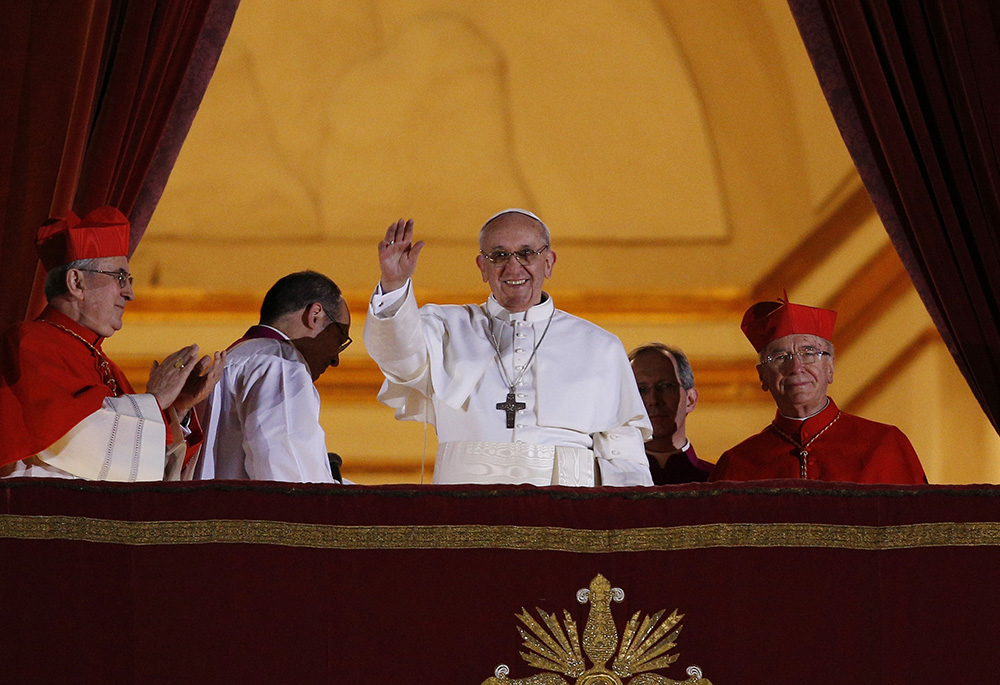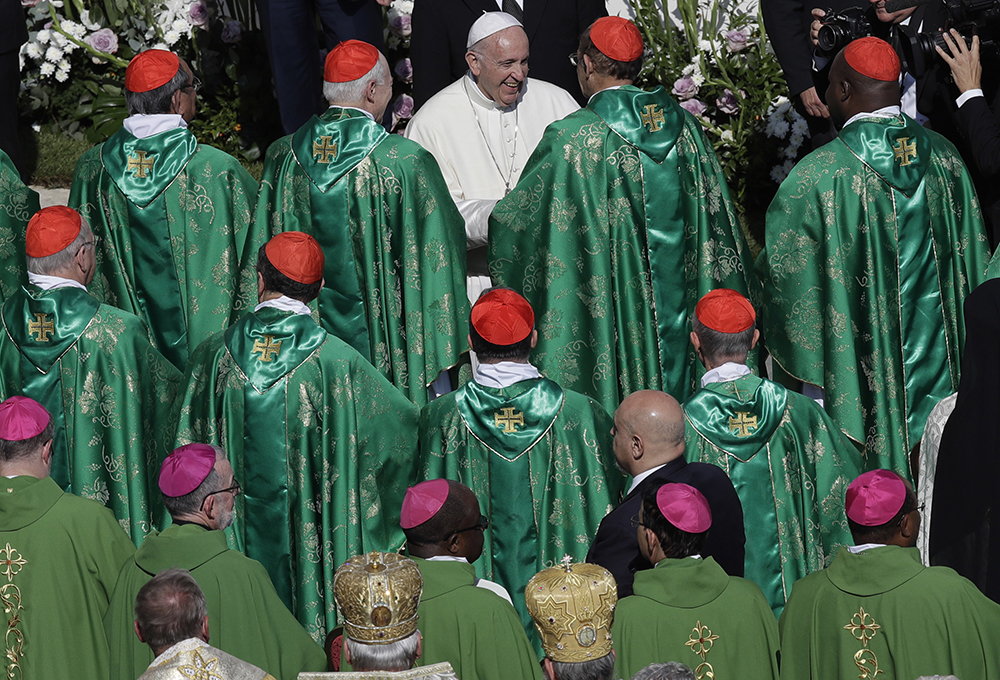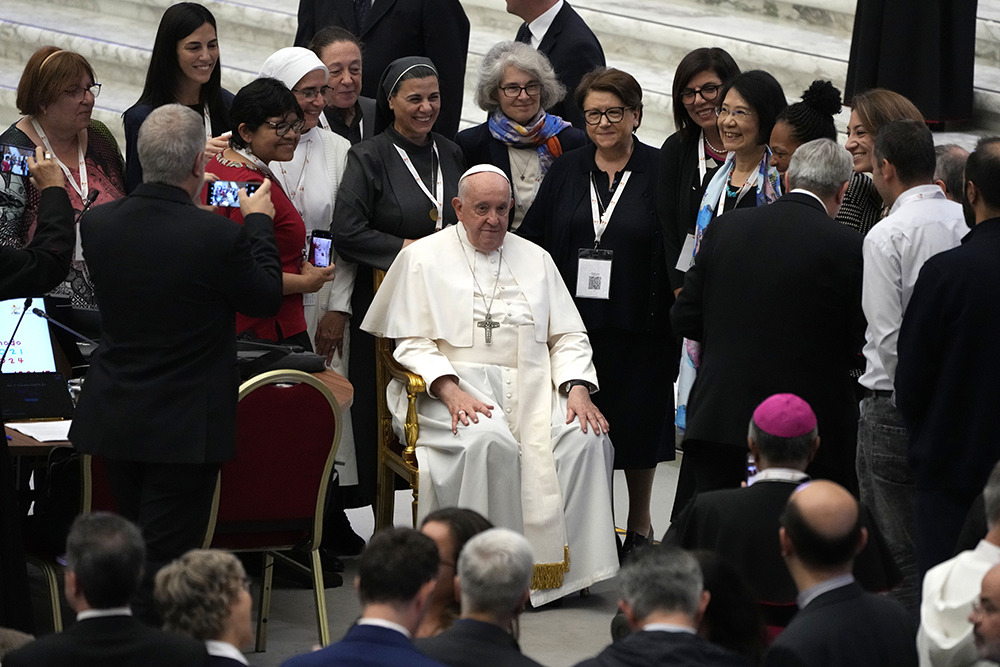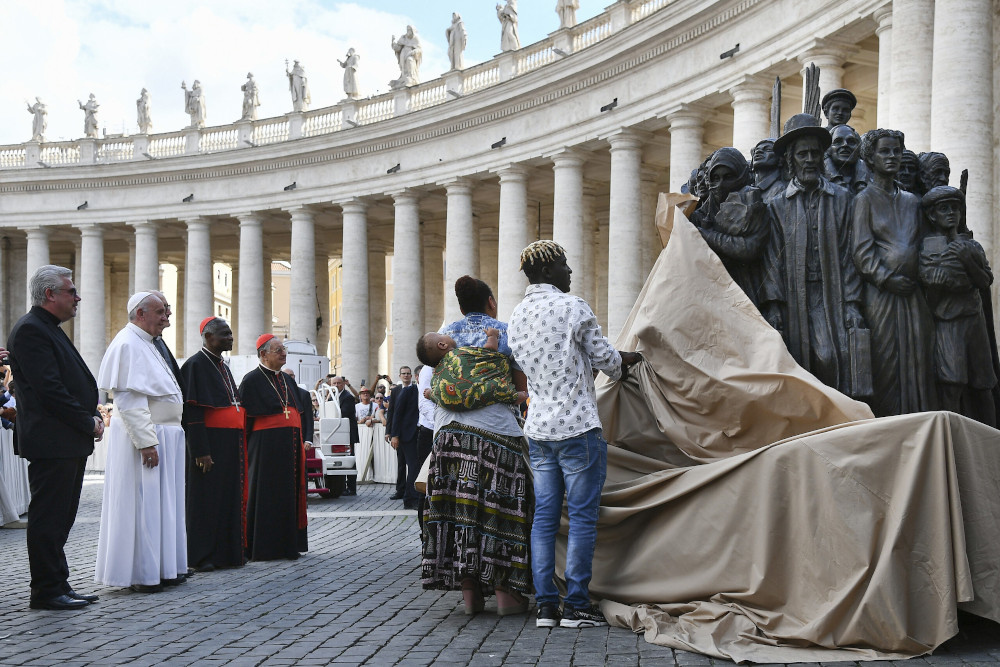
Pope Francis waves from the central balcony of St. Peter's Basilica following his election March 13, 2013. Pope Francis died April 21. (CNS/Paul Haring)
The whole world is mourning the death of Pope Francis, who passed away on Monday (April 21), during the 13th year of his papacy.
He may have disappointed liberals who wanted him to change the church's teaching on birth control, gay marriage, married clergy and women priests.
He may have scandalized conservatives who wanted him to be more like John Paul II and Benedict XVI, who cracked down on dissenters and condemned the things progressives wanted.
But he was loved by ordinary Catholics who saw in him a compassionate pastor who cared about people, especially the poor and the marginalized. The Pew Research Center found that 75% of U.S. Catholics viewed Pope Francis favorably in 2024. Although his conflicts with Donald Trump affected his ratings, even 63% of Republicans had a favorable opinion of the pope. American politicians would kill for these numbers.
Jorge Mario Bergoglio was a little-known Argentine cardinal when he was chosen to be pope, and much of what we thought we knew about him then was wrong.
When Bergoglio was elected as pope, I was sitting in front of a BBC camera preparing to be interviewed and uttered a word I cannot print in my column. Luckily, my mic was off. All I knew about Bergoglio was that my friends in Latin America, liberation theologians and Jesuits, did not like him, calling him conservative and authoritarian.

Pope Francis and bishops leave the morning session of the Synod of Bishops for the Amazon at the Vatican on Oct. 8, 2019. (CNS/Paul Haring)
I was not alone in my ignorance. George Weigel, the conservative Catholic commentator and biographer of Pope John Paul II, opined in a column shortly after Francis’ election that the sole disappointment in John Paul and Pope Benedict XVI for many cardinals was that these popes had not reformed the Jesuits. According to Weigel, the cardinals had decided the only way to reform the Jesuits was to elect a conservative one as pope.
Weigel claimed to know the mind of Bergoglio because he had spent time talking with him in Buenos Aires about the Jesuits and the church. My guess is that Weigel did most of the talking while Bergoglio sat poker-faced, leading Weigel to think the archbishop agreed with everything he said.
Within a couple of weeks, we learned how wrong we both were. The cardinals had elected as pope a man who would change the style of being pope, attack clericalism, empower the laity, open the church to conversation and debate and change the pastoral and public priorities of the church.
Although Pope Francis did not change doctrine, he was revolutionary in every other way.
The stylistic change was immediately evident when, appearing from the balcony of St. Peter's for the first time, Francis, in a simple white cassock, greeted the people informally and asked them to pray over him before he blessed them.
His simple style was linked to a full-throated attack on clericalism. He told cardinals and bishops not to act like princes. Leadership means service, he told them. Shepherds should smell like their sheep, he advised. Clergy were to be "gentle, patient and merciful," he said, with an "outward simplicity and austerity of life."
Although Francis became known for his compassion and kindness, this did not apply to the clergy, with whom he could be very tough. Here he sounded like the authoritarian director of novices and Jesuit provincial that he once was. This became especially true in the manner he removed bishops who had not dealt forthrightly with sexual abuse.
Linked to this attack on clericalism was his desire to empower the laity. Do we give the laity "the freedom to continue discerning, in a way befitting their growth as disciples, the mission which the Lord has entrusted to them?" he asked the bishops. "Do we support them and accompany them, overcoming the temptation to manipulate them or infantilize them?"
Advertisement
He practiced what he preached by opening high-ranking positions in the Vatican to laymen and women. He made laypeople full participants in the synod.
Francis also opened the church to conversation and debate in a way that had not been seen in the church since the Second Vatican Council. Fearing the church had become too chaotic, John Paul had used Cardinal Joseph Ratzinger to clamp down on priests and theologians who wanted to continue discussing doctrinal issues in the wake of Vatican II.
Francis, on the other hand, held that "open and fraternal debate makes theological and pastoral thought grow. That doesn’t frighten me. What's more, I look for it." This freed theologians to talk about how the church could present the gospel message in a way that is understandable in the 21st century.
Francis was also critical of the Curia’s control over what happened at the synod of bishops. He recalled being told what could and could not be discussed at a synod he was involved in leading. He believed the synods had become not forums for advising the pope but places for participants to show their loyalty to the pontiff and the Vatican.

Pope Francis, top, greets cardinals at the end of the opening Mass for the Synod of Bishops on Young People, in St. Peter’s Square, at the Vatican, Wednesday, Oct. 3, 2018. The synod brings together 266 bishops from five continents for talks on helping young people feel called to the church at a time when church marriages and religious vocations are plummeting in much of the West. (AP/Alessandra Tarantino)
At his first synod as pope, Francis told the participants: "Speak clearly. Let no one say, 'This can’t be said.' … Everything we feel must be said, with parrhesia [boldness]." He used the Greek word "parrhesia," describing how St. Paul addressed St. Peter at what could be called the first synod in Jerusalem, when the disciples discussed the obligation of gentile Christians to follow traditional Jewish practices.
In other words, Francis was telling the synod participants, "treat me the way St. Paul treated St. Peter."
Ironically, conservatives used this new freedom to attack the pope for allowing free debate. They had labeled as dissenters anyone who questioned the actions or teachings of John Paul and Benedict, but now they became vocal in their dissent. "Loyalists" became rebels, showing that their true loyalty was not to the papacy but to their own opinions.
In the Synod of Bishops on synodality (2023 and 2024), Francis initiated a process of discerning where the Spirit is leading the church that began with praying together and listening to one another. This was opposite of the clericalism that had infected the church for so long.

Pope Francis poses with a group of women before a session of the 16th general assembly of the synod of bishops in the Paul VI Hall at The Vatican, Oct. 28, 2023. The seventh from left is Sr. Nathalie Becquart, undersecretary in the Vatican's Synod of Bishops. (AP/Alessandra Tarantino)
For Francis, the synodal process was more important than any decisions that come out of a synod. His hope was that the process would transform the church into a synodal church. This was disappointing for progressive Catholics who wanted results: married priests, women priests and changes in church teaching on sex and gender. It was also scary to conservatives who feared the hierarchy was losing control.
Francis also changed the pastoral priorities of the church. He wanted a poor church for the poor, one that would serve, accompany and defend the poor. He described the church as a field hospital for the wounded, not a country club for the rich and beautiful. He stressed compassion, mercy and reconciliation.
He felt the church's message was too complicated. "We lose people because they don’t understand what we are saying, because we have forgotten the language of simplicity," he said. This led conservatives to see him as an intellectual lightweight in comparison with John Paul and Benedict.
And while others blamed the faithful or the culture for the exodus from the church, Francis feared people saw the church as "too weak, … distant from their needs, … cold, … caught up with itself, … a prisoner of its own rigid formulas, … a relic of the past, unfit for new questions."
For Francis, the first words of evangelization are about God's love and compassion. We should preach the Gospel, not the catechism or a rule book. As the Gospel of Matthew teaches us in Chapter 25, living the faith (orthopraxis) is more important than how we talk about faith (orthodoxy).

Pope Francis, left, watches the unveiling of the new sculpture "Angels Unawares" on the occasion of the Migrant and Refugee World Day, in St. Peter’s Square, at the Vatican, on Sept. 29, 2019. (Vincenzo Pinto/Pool Photo via AP)
Francis also changed the public priorities of the church. In an interview during his first year in office, he said he would not obsess over abortion, gay marriage and birth control since everyone knows what the church teaches on these topics. Rather, he attacked unregulated capitalism and globalization. He criticized war and called for peace. In words and actions, he defended migrants, refugees and the marginalized.
This interview encouraged progressives but angered conservatives, who argue the church needs to combat today's culture, which rejects traditional values on sex and family. Francis never changed church teaching on these topics, but he was less condemnatory and more welcoming to those who did not accept the church's teaching.
Francis continued and advanced the work of John Paul in interreligious dialogue, meeting and issuing joint statements with the top Shiite leader in Iraq and the top Sunni leader in Egypt.
Finally, in his 2015 encyclical "Laudato Si’" he wholeheartedly embraced the environmental movement and called on the church and the world to deal with global warming.
Although I loved and supported Francis, he was not perfect. His language about women drove First-World feminists nuts. One might call him a Third-World feminist because he was concerned about human trafficking and poverty, not language. He promoted women to positions of power in the church bureaucracy but would not ordain them priests.
And although he began holding bishops accountable for not dealing with sexual abuse, he was not perfect in addressing abuse. He was also slow in appointing bishops who supported his policies.
Nor did he complete the work of Curial reform. Rather than firing people who were incompetent or disloyal, he called them to conversion. The church is terrible at human resource management. It tends to be either authoritarian or too gentle, paternalistic or bureaucratic.
Nor was he willing to spend the money on the lay expertise necessary to reform Vatican finances. Cleaning up the Vatican bank cost over a million dollars in accounting fees. Cleaning up the rest of the Vatican finances will have similar costs. Forensic accountants are not cheap.
No matter who is elected, the impact of Francis on the papacy will be long-lasting. Like Vatican II, he has opened windows that are difficult to close.
Francis was not a miracle worker. His impact was limited because many bishops and clergy did not share his vision for the church. People loved Francis, but they often did not see him in those leading their parishes or dioceses.
Francis was attacked from the right and the left. Conservatives are plotting to make sure there is a return to something like the papacies of Benedict and John Paul. There are even rumors that "opposition research" has been done to dig up dirt on cardinals who might continue down Francis' path.
And yet the odds are still in favor of continuity between this pope and the next; Francis appointed 80% of the 135 cardinal electors who will choose his successor. The cardinals will not reject him by electing someone who does not respect his legacy.
No matter who is elected, the impact of Francis on the papacy will be long-lasting. Like Vatican II, he has opened windows that are difficult to close.
This column updates and adds to Thomas Reese's 2023 column "The legacy of a decade of Pope Francis."





